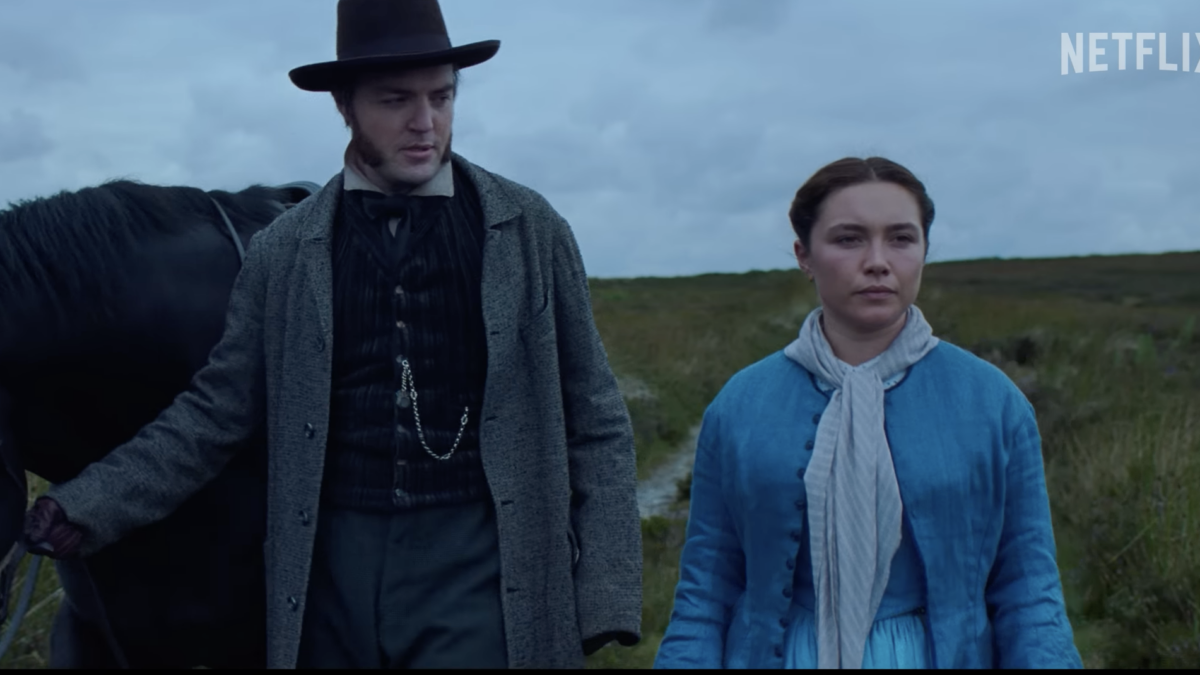Although atheists like to claim the mantel of facts and logic, most of their arguments are made through emotion-driven narratives about their superior intelligence and virtue over the narrow-minded religious community. This narrative is exemplified in Netflix’s new period drama and psychological thriller, “The Wonder,” starring Florence Pugh.
Pugh plays an English nurse Lib Wright, who is summoned to a tiny village in Ireland in the 1860s in order to investigate the miracle of a girl who has not eaten for months yet remains perfectly healthy. Sure enough, there are shenanigans behind this phenomenon, and Wright is forced to confront the hypocrisy and backwardness of the community.
As one might expect, stereotypes abound in this film. Nurse Wright is a hyper-competent girl-boss scientist who bravely cuts through superstition and sentiment. The village elders are unimaginative boors who shut her down and insist on divine intervention. And the person at the heart of the story is an innocent girl who is the brainwashed victim of a fundamentalist culture that cares more for her blind obedience than her personal well-being.
Many film critics have lauded Pugh’s performance, though she plays the same role that she always seems to play: the humorless young woman who has to deal with other people’s nonsense. And, just like her performance in “Black Widow,” “Little Women,” or “Don’t Worry, Darling,” her emotional range lies somewhere between exasperated and angry. Needless to say, she’s hardly able to carry a movie on her own, but woke filmmakers will try to push her all the same.
The combination of a one-dimensional lead and a host of stereotypes leads to the predictable style of the film which, like most atheist fables, is grim and bleak. The sun never shines in this part of Ireland, no one smiles or talks to one another, and the soundtrack is atonal and disturbing. Even if this seems to give the film gravitas and credibility, it also makes it extremely slow and boring.
However, the even greater offense of “The Wonder” is its complete rejection of reality. A nurse driven solely by the truth wouldn’t exist, nor would any village invite her for her expertise just so they could put obstacles in her way. The girl who is fed with “mana from Heaven” would easily be found out, and almost certainly be doubted by everyone, if not ignored. In other words, the whole premise of the movie is simply fantastical escapism.
This can be contrasted with the classic film “Song of Bernadette,” which recounts actual events surrounding an actual miracle. When the peasant girl Bernadette of Soubirous claims to have had a vision of Mary, everyone doubts her, though there are certain details that give them reason to verify her claims. The Roman Catholic Church eventually sends in its experts who do a thorough examination of the issue, cross-examining Bernadette, picking apart the details of her visions and accompanying healings, and considering all possible alternative explanations. All this makes for a much more compelling and less predictable movie that’s a joy to watch.
Far from keeping believers mired in superstition, the church has always stressed inquiry and testing unproven theories and ideas. Even secular heroes like Galileo suffered persecution because of their failure to sufficiently prove their ideas before publicizing them, not because the church was anti-science and sought to censor unorthodox scholars.
More often than not, it is the atheists who undermine science and legitimate truth-seeking by denying certain ideas right off the bat, which in turn leads to various superstitions. They don’t think to question experts, unexplained phenomena, or debunked theories, nor do they think to question their own selective skepticism. For this reason, there’s perhaps no better title to a book on Christian apologetics than “I Don’t Have Enough Faith to Be an Atheist.”
And, concerning the argument implied in “The Wonder” that religion hinders civic progress, it is more correct to say that social reform nearly always originates from religious believers. Besides encouraging healthy skepticism, religion also happens to inspire charitable action. In truth, it was the priests and nuns saving the sick and starving in Ireland, not enlightened nurses from Imperialist England. It’s dishonest and insulting to pretend otherwise.
Nevertheless, atheists will continue to perpetuate their falsehoods and tell sad stories because this is all they have. They will hail mediocre films like “The Wonder” as beautiful and true because they have accepted a simplified version of reality that leaves out the complexities of the soul, miracles, and God. Even though such movies may be influencing younger generations to become atheists in greater numbers, they are still tedious, unrealistic slogs that keep audiences in the figurative dark so they can better put them to literal sleep.








